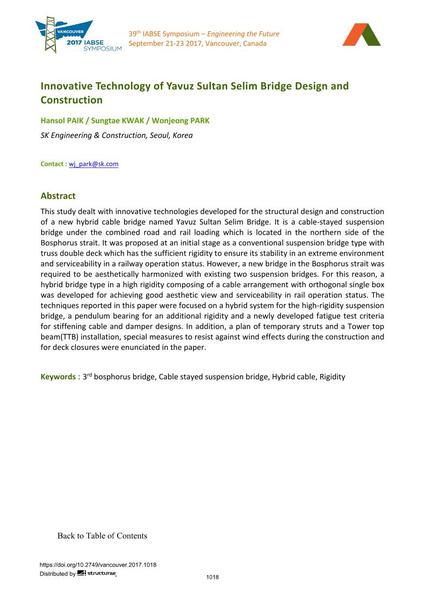Innovative Technology of Yavuz Sultan Selim Bridge Design and Construction

|
|
|||||||||||
Détails bibliographiques
| Auteur(s): |
Hansol Paik
(SK Engineering & Construction, Seoul, Korea)
Sungtae Kwak (SK Engineering & Construction, Seoul, Korea) Wonjeong Park (SK Engineering & Construction, Seoul, Korea) |
||||
|---|---|---|---|---|---|
| Médium: | papier de conférence | ||||
| Langue(s): | anglais | ||||
| Conférence: | IABSE Symposium: Engineering the Future, Vancouver, Canada, 21-23 September 2017 | ||||
| Publié dans: | IABSE Symposium Vancouver 2017 | ||||
|
|||||
| Page(s): | 1018-1025 | ||||
| Nombre total de pages (du PDF): | 8 | ||||
| Année: | 2017 | ||||
| DOI: | 10.2749/vancouver.2017.1018 | ||||
| Abstrait: |
This study dealt with innovative technologies developed for the structural design and construction of a new hybrid cable bridge named Yavuz Sultan Selim Bridge. It is a cable-stayed suspension bridge under the combined road and rail loading which is located in the northern side of the Bosphorus strait. It was proposed at an initial stage as a conventional suspension bridge type with truss double deck which has the sufficient rigidity to ensure its stability in an extreme environment and serviceability in a railway operation status. However, a new bridge in the Bosphorus strait was required to be aesthetically harmonized with existing two suspension bridges. For this reason, a hybrid bridge type in a high rigidity composing of a cable arrangement with orthogonal single box was developed for achieving good aesthetic view and serviceability in rail operation status. The techniques reported in this paper were focused on a hybrid system for the high-rigidity suspension bridge, a pendulum bearing for an additional rigidity and a newly developed fatigue test criteria for stiffening cable and damper designs. In addition, a plan of temporary struts and a Tower top beam(TTB) installation, special measures to resist against wind effects during the construction and for deck closures were enunciated in the paper. |
||||
